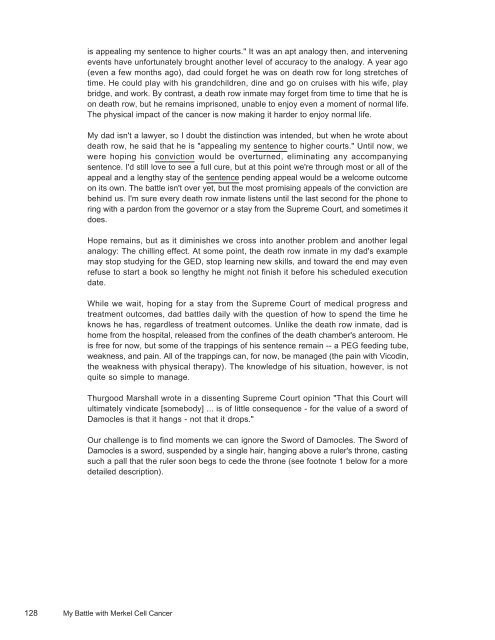You also want an ePaper? Increase the reach of your titles
YUMPU automatically turns print PDFs into web optimized ePapers that Google loves.
128<br />
is appealing my sentence to higher courts." It was an apt analogy then, and intervening<br />
events have unfortunately brought another level of accuracy to the analogy. A year ago<br />
(even a few months ago), dad could forget he was on death row for long stretches of<br />
time. He could play <strong>with</strong> his grandchildren, dine and go on cruises <strong>with</strong> his wife, play<br />
bridge, and work. By contrast, a death row inmate may forget from time to time that he is<br />
on death row, but he remains imprisoned, unable to enjoy even a moment of normal life.<br />
The physical impact of the cancer is now making it harder to enjoy normal life.<br />
<strong>My</strong> dad isn't a lawyer, so I doubt the distinction was intended, but when he wrote about<br />
death row, he said that he is "appealing my sentence to higher courts." Until now, we<br />
were hoping his conviction would be overturned, eliminating any accompanying<br />
sentence. I'd still love to see a full cure, but at this point we're through most or all of the<br />
appeal and a lengthy stay of the sentence pending appeal would be a welcome outcome<br />
on its own. The battle isn't over yet, but the most promising appeals of the conviction are<br />
behind us. I'm sure every death row inmate listens until the last second for the phone to<br />
ring <strong>with</strong> a pardon from the governor or a stay from the Supreme Court, and sometimes it<br />
does.<br />
Hope remains, but as it diminishes we cross into another problem and another legal<br />
analogy: The chilling effect. At some point, the death row inmate in my dad's example<br />
may stop studying for the GED, stop learning new skills, and toward the end may even<br />
refuse to start a book so lengthy he might not finish it before his scheduled execution<br />
date.<br />
While we wait, hoping for a stay from the Supreme Court of medical progress and<br />
treatment outcomes, dad battles daily <strong>with</strong> the question of how to spend the time he<br />
knows he has, regardless of treatment outcomes. Unlike the death row inmate, dad is<br />
home from the hospital, released from the confines of the death chamber's anteroom. He<br />
is free for now, but some of the trappings of his sentence remain -- a PEG feeding tube,<br />
weakness, and pain. All of the trappings can, for now, be managed (the pain <strong>with</strong> Vicodin,<br />
the weakness <strong>with</strong> physical therapy). The knowledge of his situation, however, is not<br />
quite so simple to manage.<br />
Thurgood Marshall wrote in a dissenting Supreme Court opinion "That this Court will<br />
ultimately vindicate [somebody] ... is of little consequence - for the value of a sword of<br />
Damocles is that it hangs - not that it drops."<br />
Our challenge is to find moments we can ignore the Sword of Damocles. The Sword of<br />
Damocles is a sword, suspended by a single hair, hanging above a ruler's throne, casting<br />
such a pall that the ruler soon begs to cede the throne (see footnote 1 below for a more<br />
detailed description).<br />
<strong>My</strong> <strong>Battle</strong> <strong>with</strong> <strong>Merkel</strong> <strong>Cell</strong> <strong>Cancer</strong>


